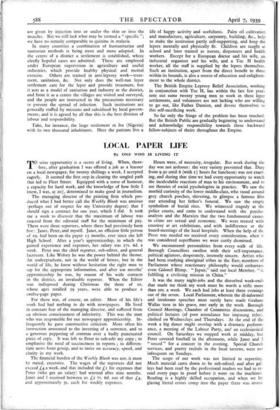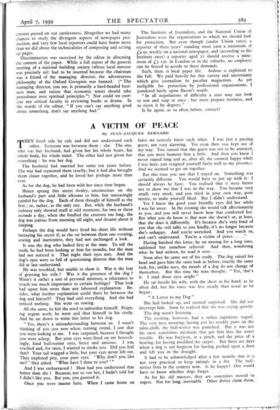LOCAL PAPER LIFE
By ONE WHO IS LIVING IT
TO seize opportunity is a secret of living. When, there- fore, after graduation I was offered a job as a learner on a local newspaper, for twenty shillings a week, I accepted eagerly. It seemed the first step in clearing the tangled path that led to Fleet Street. Equipped with a sense of humour, a capacity for hard work, and the knowledge of how little I knew, I was, at 2ol, determined to make good in journalism.
The managing director of the printing firm which pro- duced what I had better call the Weekly Blank was anxious (perhaps out of respect for my University degree) that I should sign a contract for one year, which I did. It took me a week to discover that the maximum of labour was exacted from the editorial staff for the minimum of pay. There were three reporters, where there had previously been five: Janet, Peter, and myself. Janet, an efficient little person of 19, had been on the paper 15 months, ever since she left High School. After a year's apprenticeship, in which she gained experience and expenses, her salary was 27s. 6d. a week. Peter was the chief reporter, sub-editor, and general factotum. Like Wolsey he was the power behind the throne. An undergraduate, not in the world of letters, but in the world of life, he knew without hesitation the right man to tap for the appropriate information, and after ten months' apprenticeship he was, by reason of his wide contacts in the district, an invaluable reporter. When the Editor was indisposed during Christmas the three of us, whose ages totalled 59 years, were able to produce a twelve-page paper.
For there was, of course, an editor. Most of his life's work had had nothing to do with newspapers. He lived in constant fear of the managing director, and suffered from an obvious consciousness of inferiority. This was the man who was responsible for our newspaper apprenticeship. In- frequently he gave constructive criticism. More often his instruction amounted to the inverting of a sentence, and to a generous peppering of commas over a badly punctuated piece of copy. It was left to Peter to sub-edit my copy ; to emphasise the need of succinctness in reports ; to differen- tiate news from gossip, and to insist on accuracy, speed, and clarity in my work.
The financial burden of the Weekly Blank was not, it must be stated, excessive. The wages of the reporters did not exceed £4 a week, and that included the LI for expenses that Peter (who got no salary) had wrested after nine months. Janet and I received between us L2 7s. 6d. out of that £4, and approximately 3s. each for weekly expenses. Hours were, of necessity, irregular. But work during the day was not arduous: the very variety prevented that. Duty from 9.3o until 6 (with i 2 hours for luncheon) was not exact- ing, and during that time we had every opportunity to watch the incalculable reactions of man to his environment, and to see theories of social pyschologists in practice. We saw the morbid curiosity of the lower middle-class, who stood around grey church porches, shivering, to glimpse a famous film star attending her father's funeral. We saw the empty symbolism of burial rites. We witnessed tragedy at the police courts, and came to understand with the psycho- analysts and the Marxists that the two fundamental causes to crime are sexual and economic. We were treated with courtesy at art exhibitions, and with indifference at the board-meetings of the local hospitals. When the help of the Press was needed we received every consideration, when it was considered superfluous we were curtly dismissed.
We encountered personalities from every walk of life. Borough Councillors swollen with their self-importance, political agitators, desperately, intensely sincere. Artists who had been studying aboriginal tribes in the East, members of Parliament whose reactionary philosophy would embarrass even Colonel Blimp. " Japan," said our local Member, "is fulfilling a civilising mission in China."
It was the many night-jobs and the disturbed week-ends that made me think my work must be worth a trifle more than 205. a week. We each had jobs at least three evenings out of the seven. Local Parliament, wherein the ill-informed and intolerant speeches must surely have made Graham Wallas turn in his grave, met early in the week. Borough Council Meetings, Chamber of Commerce discussions, and political lectures (of poor attendance but imposing titles), clashed on Wednesdays and Thursdays. At the end of the week a big dance might overlap with a dramatic perform- ance, a meeting of the Labour Party, and an ecclesiastical council. On Saturdays we stopped work at midday, but Peter covered football in the afternoon, while Janet and I " tossed " for a concert in the evening. Special Church services, and poetry recitals in the local taverns, were not infrequent on Sundays.
The scope of our work was not limited to reporting. Much material came down to be sub-edited, and after gal- leys had been read by the professional readers we had to re- read every page in proof before it went on the machines. Reading is a highly skilled occupation, and when we let glaring literal errors creep into the paper there was severe censure passed on our carelessness. Altogether we had many chances to study the divergent aspects of newspaper pro- duction, and very few local reporters could have learnt more than we did about the technicalities of composing and setting up pages.
Discrimination was exercised by the editor in allocating the content of the paper. While a full report of the general meeting of a national building society (whose local interest was precisely nil) had to be inserted because the chairman was a friend of the managing director, the adventurous philosophy of the Oxford Groupists was banned. (" The managing director, you see, is primarily a hard-headed busi- ness man, and insists that economic tenets should take precedence over spiritual principles.") Nor could we exer- cise any critical faculty in reviewing books or drama. In the words of the editor, " If you can't say anything good about something, don't say anything bad." The Institute of Journalists, and the National Union of Journalists were the organisations to which we should look for protection. But even though (under Union rates) a reporter of three years' standing must earn a minimum of Ls, gs. weekly on a national newspaper, and (according to the Institute rates) a reporter aged 21 should receive a mini- mum of £3 t5s. in London or in the suburbs, no employer can be forced to accede to these demands.
Such, then, is local paper life. Ardour is exploited to the full. We paid heavily for that variety and uncertainty which give journalism its peculiar magnetism. As yet ineligible for protection by professional organisations, I pondered lately upon Bacon's words.
" In all negotiations of difficulty a man may not look to sow and reap at once ; but must prepare business, and so ripen it by degrees."
Is he again, as so often before, correct?











































 Previous page
Previous page